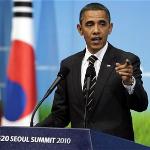America Tells G20: We're Closed for Business
 America’s failure to ink a trade agreement with South Korea will send an embarrassing message to the rest of the world.
America’s failure to ink a trade agreement with South Korea will send an embarrassing message to the rest of the world.
America’s failure to ink a trade agreement with South Korea will surely lead to plenty of finger pointing. The Obama administration blames the Chinese and, believe it or not, Korea’s own “green” policies. Republicans will blame the administration itself. Koreans, rightly perhaps, will blame just about everyone. In the end, however, it seems like the long term consequences of the Obama administration failure will be both smaller (economically) and larger (thematically) than most analysts now guess.
On one hand, with or without the trade agreement, both the U.S. and South Korea will continue to strengthen trade ties. The internet, ever-lower logistics costs and global trade regimes like the WTO will see to this. Indeed, U.S. trade with South Korea has grown pretty steadily even in bad times like the 2008-2009 U.S. recession and during the “Asian Flu” that hit Korea’s economy hard between 1997 and 1998. So long as the U.S. makes movies, software, jet planes, and trucks while Korea builds cars and electronics, this isn’t going to change.
On the other hand, the Obama administration’s failure to reach the trade agreement shows just how much momentum trade protectionism has gained. This is bad and it’s notable that President Obama still hasn’t signed or submitted to Congress a single trade agreement of any sort. But he didn’t cause the problem. After all, even the Bush administration’s free trade efforts—a politically important but economically meaningless pact with several Central American nations, an equally inconsequential bilateral treaty with Peru, and a more economically significant but still snooze-inducing pact with Singapore—seem to have been selected for lack of economic controversy. The Singapore pact brought the U.S. closer to a developed high-wage economy that couldn’t plausibly be expected to spark the “race to the bottom” some leftists fear while the Latin American agreements were made with countries so small that several economists I talked with at the time (I worked in the Senate when the pact came up for approval) told me that they couldn’t model the likely consequences. Even playing it safe, however, didn’t insulate Bush from the destructive, protectionist drum beating emanating from the Left and the Right. And it set the stage for an even more cowardly policy from the Obama administration.
Quite simply, the failure to follow through on what should have been an easy economic gain for everyone will send a clear signal to the world: The United States is closed for business.